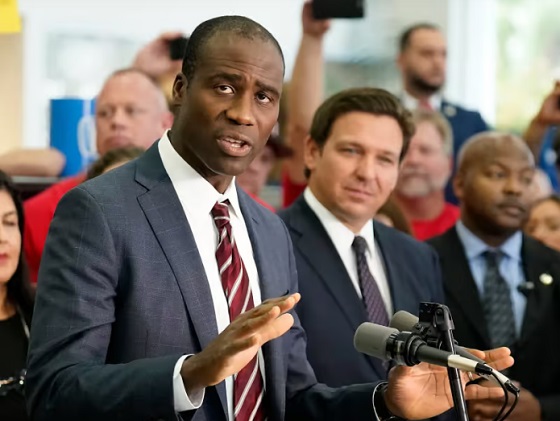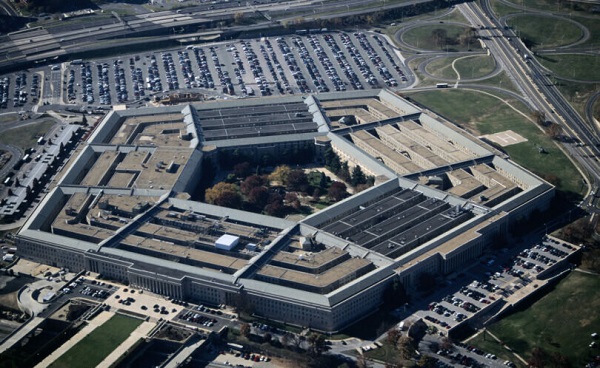COVID-19
Florida Surgeon General’s Call to Halt Use of the Vaccines Sparks Debate

Dr Joseph Ladapo, Florida’s Surgeon General at the microphone
From the Brownstone Institute
BY
On January 3, 2024, Florida Surgeon General Joseph Ladapo called for a halt in the use of the mRNA Covid-19 vaccines after US health agencies failed to adequately address his concerns about DNA contamination in the products.
In a statement on X, Ladapo accused the FDA and CDC of always playing it “fast and loose” with Covid-19 safety, but their failure to test whether DNA fragments in the vaccine could integrate into a person’s genome was “intolerable.”
As I and others have pointed out on numerous occasions, the FDA’s own guidance on regulatory limits for residual DNA in vaccines states “there are several potential mechanisms by which residual DNA could be oncogenic [cause cancer], including the integration and expression of encoded oncogenes or insertional mutagenesis following DNA integration.”
In a letter, Ladapo had also asked the two agencies if they’d carried out any risk assessment regarding the presence of the “SV40 promoter” in the vaccines, which is thought to enhance DNA integration into host cells.
But the FDA’s top vaccine official Peter Marks responded to Ladapo’s demand for answers with intransigence and obfuscation.
Similar to how the FDA shut down my previous enquiries into this matter, the agency failed to provide Ladapo with any evidence that it had even conducted tests to address the risk of genomic integration.
In fact, Marks had the temerity to imply that ongoing discussion about this topic was perpetuating misinformation “which results in vaccine hesitancy that lowers vaccine uptake.”
Ladapo explained;
DNA integration poses a unique and elevated risk to human health and to the integrity of the human genome, including the risk that DNA integrated into sperm or egg gametes could be passed onto offspring of mRNA Covid-19 vaccine recipients. If the risks of DNA integration have not been assessed for mRNA Covid-19 vaccines, these vaccines are not appropriate for use in human beings.
He also recommended that providers concerned about health risks of Covid-19 should prioritise patient access to non-mRNA Covid-19 vaccines and treatment.
Quick to dismiss Ladapo’s concerns was Paul Offit, director of the Vaccine Education Centre at Children’s Hospital of Philadelphia, who serves on the FDA’s vaccine advisory committee.
Offit hit back in a video published on MedPage Today saying, “It is hard to believe that Dr Ladapo actually issued that statement…[DNA fragments] can’t possibly do harm. So scaring people unnecessarily like this has been hard to watch.”
 Professor Paul Offit, Children’s Hospital of Philadelphia
Professor Paul Offit, Children’s Hospital of Philadelphia
Unfortunately, Offit’s video contains a series of erroneous statements that exposes his fundamental misunderstanding of the manufacturing and regulation of Covid vaccines.
For example, Offit says it’s unlikely that DNA fragments enter the cytoplasm of cells, or survive, once they’re inside.
“Our cytoplasm hates foreign DNA and it has a variety of mechanisms, including innate immunological mechanisms and enzymes, to destroy foreign DNA,” says Offit.
“That DNA, which would never survive the cytoplasm, would have to then cross the nuclear membrane into the nucleus, which would require a nuclear access signal that these DNA fragments don’t have…So the chance that DNA could affect your DNA is zero,” he adds.
But this statement is disingenuous on multiple fronts.
Offit talked about DNA fragments as if they were not encapsulated in lipid nanoparticles, which specifically ferry the genetic material into the cell cytoplasm. Indeed, without the lipid nanoparticles, the vaccines would never have made it to market.
A recent publication in Nature found that within hours, around 7% of cells are integrated when mixed with a transfection solution containing linear pieces of DNA.
Offit also said that DNA wouldn’t cross into the cell’s nucleus, but scientists have known that foreign DNA can be delivered into mammalian cells to modify a host cell’s genetic makeup in a process called “DNA transfection.”
It also ignores the fact that the DNA fragments contain the “SV40 promoter” which includes a nuclear targeting signal (NTS) to aid its entry into the nucleus.
A full critique of Offit’s commentary was recently published by Dr Robert Malone who pioneered some of the early work into mRNA technology.
Phillip Buckhaults, a cancer genomics expert, and professor at the University of South Carolina, has confirmed the presence of DNA fragments in the vaccines after replicating the work of McKernan et al.
Buckhaults has welcomed Ladapo’s announcement.
“I’m glad Dr Ladapo is taking a firm leadership stance to protect the people under his care. I think he is taking a lot of heat over genuinely looking out for others. I think he is acting in good faith and that is to be respected,” says Buckhaults.
 Professor Phillip Buckhaults, University of South Carolina
Professor Phillip Buckhaults, University of South Carolina
He also believes that Ladapo’s stance on the mRNA vaccines is “based on solid scientific reasoning” because the long-term genomic safety has not been demonstrated for fragments of DNA that are encapsulated in lipid nanoparticles.
However, rather than completely halting the vaccines, Buckhaults says he would err on the side of caution and still “recommend the vaccine to select populations who are at high risk for death from [Covid-19].”
Buckhaults hopes that Ladapo can use his authority to compel the FDA to request an extra “cheap and easy step” in the processing of the vaccines to remove the vast majority of DNA from upcoming batches.
“Then we would not even need to have this argument about DNA anymore. The risk of the DNA would be essentially gone and the crisis in confidence in leadership would be addressed,” he says.
Buckhaults has testified before a South Carolina Senate hearing about his alarm over the “very real hazard” that these fragments of foreign DNA can insert themselves into a person’s genome and become a “permanent fixture of the cell.”
He has also discussed with me at length the potential harms to people’s health caused by DNA contamination in the mRNA vaccines. Last year, Buckhaults notified the FDA of his concerns via email but never received a response.
Supplementary information: reading:
FDA shuts down enquiries about DNA contamination in [Covid] vaccines
EXCLUSIVE: An interview with Buckhaults about DNA contamination in [Covid] vaccines
Republished from the author’s Substack
International
Pentagon agency to simulate lockdowns, mass vaccinations, public compliance messaging

From LifeSiteNews
With lockdowns, mass vaccination campaigns, and social distancing still on the table from the last around, it appears that AI and Machine Learning will play a much bigger role in the next.
DARPA is getting into the business of simulating disease outbreaks, including modeling interventions such as mass vaccination campaigns, lockdowns, and communication strategies.
At the end of May, the U.S. Defense Advanced Research Projects Agency (DARPA) put out a Request for Information (RFI) seeking information regarding “state-of-the-art capabilities in the simulation of disease outbreaks.”
The Pentagon’s research and development funding arm wants to hear from academic, industry, commercial, and startup communities on how to develop “advanced capabilities that drive technical innovation and identify critical gaps in bio-surveillance, diagnostics, and medical countermeasures” in order to “improve preparedness for future public health emergencies.”
Dr. @P_McCulloughMD: "This Is a Military Operation"
"The military said in 2012, 'We will end pandemics in 60 days using messenger RNA.' That's long before Moderna and Pfizer were even in the game. … They are profiting from this, but they didn't drive it." pic.twitter.com/71jAV5wfG0
— The Vigilant Fox 🦊 (@VigilantFox) March 12, 2023
As if masks, social distancing, lockdowns, and vaccination mandates under the unscientific guise of slowing the spread and preventing the transmission of COVID weren’t harmful enough, the U.S. military wants to model the effects of these exact same countermeasures for future outbreaks.
The RFI also asks participants “Fatality Rate & Immune Status: How are fatality rates and varying levels of population immunity (natural or vaccine-induced) incorporated into your simulations?“
Does “natural or vaccine-induced” relate to “population immunity” or “fatality rates” or both?
Moving on, the RFI gets into modeling lockdowns, social distancing, and mass vaccination campaigns, along with communication strategies:
Intervention Strategies: Detail the range of intervention strategies that can be modeled, including (but not limited to) vaccination campaigns, social distancing measures, quarantine protocols, treatments, and public health communication strategies. Specifically, describe the ability to model early intervention and its impact on outbreak trajectory.
The fact that DARPA wants to model these so-called intervention strategies just after the entire world experienced them suggests that these exact same measures will most likely be used again in the future:
“We are committed to developing advanced modeling capabilities to optimize response strategies and inform the next generation of (bio)technology innovations to protect the population from biological threats. We are particularly focused on understanding the complex interplay of factors that drive outbreak spread and evaluating the effectiveness of potential interventions.” — DARPA, Advanced Disease Outbreak Simulation Capabilities RFI, May 2025.
“Identification of optimal timelines and capabilities to detect, identify, attribute, and respond to disease outbreaks, including but not limited to biosensor density deployment achieving optimal detection timelines, are of interest.” — DARPA, Advanced Disease Outbreak Simulation Capabilities RFI, May 2025.
With lockdowns, mass vaccination campaigns, and social distancing still on the table from the last around, it appears that AI and Machine Learning will play a much bigger role in the next.
For future innovation, the DARPA RFI asks applicants to: “Please describe any novel technical approaches – or applications of diverse technical fields (e.g., machine learning, artificial intelligence, complex systems theory, behavioral science) – that you believe would significantly enhance the state-of-the-art capabilities in this field or simulation of biological systems wholistically.”
Instead of putting a Dr. Fauci, a Dr. Birx, a replaceable CDC director, a TV doctor, a big pharma CEO, or a Cuomo brother out there to lie to your face about how they were all just following The ScienceTM, why not use AI and ML and combine them with behavioral sciences in order to concoct your “public health communications strategies?”
When you look at recently announced DARPA programs like Kallisti and MAGICS, which are aimed at creating an algorithmic Theory of Mind to model, predict, and influence collective human behavior, you start to get a sense of how all these programs can interweave:
“The MAGICS ARC calls for paradigm-shifting approaches for modeling complex, dynamic systems for predicting collective human behaviour.” — DARPA, MAGICS ARC, April 2025
On April 8, DARPA issued an Advanced Research Concepts (ARC) opportunity for a new program called “Methodological Advancements for Generalizable Insights into Complex Systems (MAGICS)” that seeks “new methods and paradigms for modeling collective human behavior.”
Nowhere in the MAGICS description does it mention modeling or predicting the behavior of “adversaries,” as is DARPA’s custom.
Instead, it talks at length about “modeling human systems,” along with anticipating, predicting, understanding, and forecasting “collective human behavior” and “complex social phenomena” derived from “sociotechnical data sets.”
Could DARPA’s MAGICS program be applied to simulating collective human behavior when it comes to the next public health emergency, be it real or perceived?
“The goal of an upcoming program will be to develop an algorithmic theory of mind to model adversaries’ situational awareness and predict future behaviour.” — DARPA, Theory of Mind Special Notice, December 2024.
In December 2024, DARPA launched a similar program called Theory of Mind, which was renamed Kallisti a month later.
The goal of Theory of Mind is to develop “new capabilities to enable national security decisionmakers to optimize strategies for deterring or incentivizing actions by adversaries,” according to a very brief special announcement.
DARPA never mentions who those “adversaries” are. In the case of a public health emergency, an adversary could be anyone who questions authoritative messaging.
The Theory of Mind program will also:
… seek to combine algorithms with human expertise to explore, in a modeling and simulation environment, potential courses of action in national security scenarios with far greater breadth and efficiency than is currently possible.
This would provide decisionmakers with more options for incentive frameworks while preventing unwanted escalation.
We are interested in a comprehensive overview of current and emerging technologies for disease outbreak simulation, how simulation approaches could be extended beyond standard modeling methods, and to understand how diseases spread within and between individuals including population level dynamics.
They say that all the modeling and simulating across programs is for “national security,” but that is a very broad term.
DARPA is in the business of research and development for national security purposes, so why is the Pentagon modeling disease outbreaks and intervention strategies while simultaneously looking to predict and manipulate collective human behavior?
If and when the next outbreak occurs, the same draconian and Orwellian measures that governments and corporations deployed in the name of combating COVID are still on the table.
And AI, Machine Learning, and the military will play an even bigger role than the last time around.
From analyzing wastewater to learning about disease spread; from developing pharmaceuticals to measuring the effects of lockdowns and vaccine passports, from modeling and predicting human behavior to coming up with messaging strategies to keep everyone in compliance – “improving preparedness for future public health emergencies” is becoming more militaristically algorithmic by the day.
“We are exploring innovative solutions to enhance our understanding of outbreak dynamics and to improve preparedness for future public health emergencies.” — DARPA, Advanced Disease Outbreak Simulation Capabilities RFI, May 2025.
Kennedy on Covid Jabs as a Military Operation:
"Turns out that the vaccines were developed not by Moderna and Pfizer. They were developed by NIH.”
“They're owned. The patents are owned 50% by NIH.
They were manufactured by military contractors.”
pic.twitter.com/R6y8i8tAsD— Jonny Paradise 🌱 (@plantparadise7) April 15, 2025
Reprinted with permission from The Sociable.
Business
Audit report reveals Canada’s controversial COVID travel app violated multiple rules

From LifeSiteNews
Canada’s Auditor General found that government procurement rules were not followed in creating the ArriveCAN app.
Canada’s Auditor General revealed that the former Liberal government under Prime Minister Justin Trudeau failed multiple times by violating contract procurement rules to create ArriveCAN, its controversial COVID travel app.
In a report released Tuesday, Auditor General Karen Hogan noted that between April 2015 to March 2024, the Trudeau government gave out 106 professional service contracts to GC Strategies Inc. This is the same company that made the ArriveCAN app.
The contracts were worth $92.7 million, with $64.5 million being paid out.
According to Hogan, Canada’s Border Services Agency gave four contracts to GC Strategies valued at $49.9 million. She noted that only 54 percent of the contracts delivered any goods.
“We concluded that professional services contracts awarded and payments made by federal organizations to GC Strategies and other companies incorporated by its co-founders were not in accordance with applicable policy instruments and that value for money for these contracts was not obtained,” Hogan said.
She continued, “Despite this, federal government officials consistently authorized payments.”
The report concluded that “Federal organizations need to ensure that public funds are spent with due regard for value for money, including in decisions about the procurement of professional services contracts.”
Hogan announced an investigation of ArriveCAN in November 2022 after the House of Commons voted 173-149 for a full audit of the controversial app.
Last year, Hogan published an audit of ArriveCAN and on Tuesday published a larger audit of the 106 contracts awarded to GC Strategies by 31 federal organizations under Trudeau’s watch.
The report concluded that one in five contracts did not have proper documentation to show correct security clearances. Also, the report found that federal organizations did not monitor how the contract work was being performed.
‘Massive scandal,’ says Conservative leader Pierre Poilievre
Conservative Party leader Pierre Poilievre said Hogan’s report on the audit exposed multiple improprieties.
“This is a massive scandal,” he told reporters Tuesday.
“The facts are extraordinary. There was no evidence of added value. In a case where you see no added value, why are you paying the bill?”
ArriveCAN was introduced in April 2020 by the Trudeau government and made mandatory in November 2020. The app was used by the federal government to track the COVID jab status of those entering the country and enforce quarantines when deemed necessary.
ArriveCAN was supposed to have cost $80,000, but the number quickly ballooned to $54 million, with the latest figures showing it cost $59.5 million.
As for the app itself, it was riddled with technical glitches along with privacy concerns from users.
LifeSiteNews has published a wide variety of reports related to the ArriveCAN travel app.
-

 Censorship Industrial Complex2 days ago
Censorship Industrial Complex2 days agoConservatives slam Liberal bill to allow police to search through Canadians’ mail
-

 Business1 day ago
Business1 day agoEU investigates major pornographic site over failure to protect children
-

 Courageous Discourse2 days ago
Courageous Discourse2 days agoHealthcare Blockbuster – RFK Jr removes all 17 members of CDC Vaccine Advisory Panel!
-

 Health2 days ago
Health2 days agoRFK Jr. purges CDC vaccine panel, citing decades of ‘skewed science’
-

 Immigration2 days ago
Immigration2 days agoMass immigration can cause enormous shifts in local culture, national identity, and community cohesion
-

 Censorship Industrial Complex2 days ago
Censorship Industrial Complex2 days agoAlberta senator wants to revive lapsed Trudeau internet censorship bill
-

 Canadian Energy Centre1 day ago
Canadian Energy Centre1 day agoCross-Canada economic benefits of the proposed Northern Gateway Pipeline project
-

 Health2 days ago
Health2 days agoPolice are charging parents with felonies for not placing infants who died in sleep on their backs






